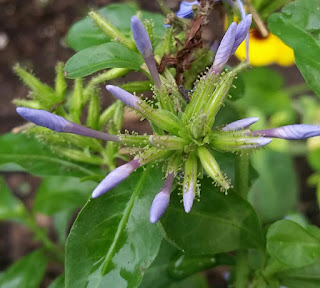Two very different women love the same man: One is younger, one is older. Though separated by years, culture and expression, they share roots. The elder is Korean, with porcelain skin and tiny stature. Her diminutive physical frame belies a feisty personality and hardworking spirit. She is stubborn and clever, qualities that helped her thrive as a military wife with three children. The children are her world, her heart. She blesses them with gifts: the latest clothes, lessons, a comfortable home, and a respect for hospitality. One by one, the children leave to walk their own paths and the small woman, with the big heart, goes outside to the garden.


In the yard, miracles are a daily event. Buds bloom, birds sing, lemons the size of grapefruits scent the air, and peaches appear at just the right time. Heavy concrete lanterns nestle among the jade plants and whimsical statues play hide and seek. There are shaded areas to sit and drink coffee or read, a swimming pool for grandchildren, a picnic table for outdoor breakfasts. She moves tirelessly among the plants, pruning, watering, fertilizing and nourishing beauty. The exhausted younger women watches, but does not see.

The younger woman is Caucasian, freckled and average in height. Her quick smile belies a stubborn streak that is deep and wide. Her college education was hard fought, and this kind of persistence allows her to flourish as a military wife. She uses her medical knowledge to push her son over health hurdles. Creativity and determination teach him to read. She reiterates that people are more important than things and that humans are nature's keepers. Little by little, he needs her less and less. Though she realizes that this was always the goal, the heartache surprises her.
She gently plucks the yellow leaves away, settles the rose bush, fertilizes it and sits back on her heels. A hummingbird drinks from the feeder. The woman smiles at the beauty of the scene. Comfy chairs for wine or coffee sit waiting on the porch. The fountain bubbles welcome for birds and pansies nod in the breeze. Wiping the sweat from her brow, she sees the older woman tending the plants. Something in her heart cracks. She realizes that two very different women share more than one thing in common. After years of pouring love into children and home, love became a habit.

Adult children need less and less tending. Parents strive to make children self-sufficient, yet when they are, it can leave a need to nurture. In the garden, careful attention is still needed. Different plants have different needs. There are rotating seasons for planting, harvesting and quiet regeneration. Sitting on the warm ground, surrounded by plants, the young woman finds herself in her mother in law's garden and the eyes of her heart see clearly.


















